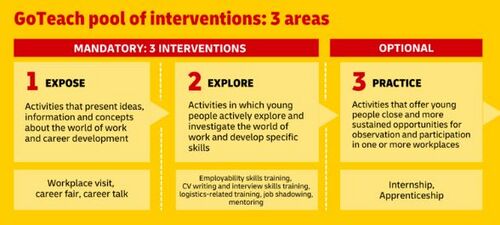No edit summary |
No edit summary |
||
| (11 intermediate revisions by 3 users not shown) | |||
| Line 14: | Line 14: | ||
==<span class="mw-headline" id="Activities">Activities</span>== | ==<span class="mw-headline" id="Activities">Activities</span>== | ||
GoTeach | ======Global GoTeach Framework ====== | ||
======GoTeach | Through GoTeach we are aiming to improve the employability of young people from vulnerable backgrounds. The more opportunities young people have to engage directly with employers and workplaces, the more likely it is that they will transition successfully into the world of work. In all participating GoTeach countries, the DHL Group employees act as role models for these young people and provide an insight into their roles and sharing skills to help participants develop the attributes they need to succeed in the workplace. Based on our experience of over 12 years of GoTeach, and the OECD research led by Anthony Mann, we have developed a standardized global framework for GoTeach. | ||
This framework (from 2023) defines the '''minimum requirement''' for all GoTeach countries going forward which will help us to measure the success and effectiveness of our sustainability efforts ensuring we will get closer to our target of offering meaningful employability interventions to all young people reached by the GoTeach program and create lasting social impact. You can find more about it in OECD publications [https://www.oecd.org/education/career-readiness/?_ga=2.267922247.894681105.1689683704-2039978863.1689683704 here] | |||
[[File:GoTeach 3 interventions.jpg|thumb|500x500px|The GoTeach pool of interventions is clustered in 3 areas|center]]Based on the GoTeach framework, we aim to guarantee '''three interventions for each GoTeach participant''' '''in the same year'''. The GoTeach pool of interventions is clustered in 3 areas: | |||
# '''Expose:''' Activities that present ideas, information and concepts about the world of work and career development (workplace visit, career fair, career talk) | |||
# '''Explore:''' Activities in which young people actively explore and investigate the world of work and develop specific skills (employability skills training, CV writing and interview skills training, logistics-related training, job shadowing, mentoring) | |||
# '''Practice:''' Activities that offer young people close and more sustained opportunities for observation and participation in one or more workplaces (internship, apprenticeship) | |||
Each country is encouraged to take ownership and plan three activities '''from area 1) Expose and area 2) Explore''' that are best suited to the needs of children and young people in their local area. With this approach, we will get closer to our target of offering meaningful employability interventions to all young people reached by our partners in 2030. | |||
Find out more about GoTeach activities in chapter [[GoTeach Activities|5. GoTeach Activities]]. [[File:GoTeachWiki:GoTeach MENA.png|500x500px|thumb| | |||
[[File:GoTeachWiki:GoTeach MENA.png| | |||
GoTeach Activity in Lebanon]] | GoTeach Activity in Lebanon]] | ||
| Line 77: | Line 33: | ||
Research shows that encounters with employers like career talks with volunteers with real-world professional experience can have a huge positive impact and furthermore that the frequency of such contact a young person experiences in school really does matter. The 7% of young people surveyed who recalled <u>four or more activities</u> while at school were <u>five times less likely not to be in education, employment or training</u> (NEET). They also <u>earned, on average, 16% more</u> than peers who recalled no such activities. | |||
Research shows that encounters with employers like career talks with volunteers with real-world professional experience can have a huge positive impact and furthermore that the frequency of such contact a young person experiences in school really does matter. The 7% of young people surveyed who recalled <u>four or more activities</u> while at school were <u>five times less likely not to be in education, employment or training</u> (NEET). They also <u>earned, on average, 16% more</u> than peers who recalled no such activities. | |||
(Motivated to achieve, UK, 2019, https://www.educationandemployers.org/new-report-published-motivated-to-achieve/) | (Motivated to achieve, UK, 2019, https://www.educationandemployers.org/new-report-published-motivated-to-achieve/) | ||
Latest revision as of 07:33, 26 October 2023
2.4.1 The Spirit of GoTeach
2.4.1.1 The spirit of GoTeach shapes the environment in which we work, impacting various key elements such as the program’s mission, vision, goals and the attributes of our culture.
2.4.1.1 Our Four Attributes
- Committed GoTeach team: GoTeach relies on collaboration. The work we do is dependent on individuals with different skills, experiences and viewpoints coming together as one global team, committing to doing their best for young people in need. Sharing the same supportive mindset, they bring passion and an open mind to the work they do in the name of GoTeach. Mutual respect and a focus on common solutions are at the very heart of our program.
- Local ownership and global framework: At a national level, the program relies on the personal commitment and responsibility that local GoTeach teams take in working together. Despite the large number of countries involved and the many differences in context, activities are unfailingly united by the same objectives.
- Sharing experience: Local employees are the biggest asset we have at GoTeach. They are our experts and role models for how successful the transition to the world of work can be, even if circumstances are challenging. All activities are focussed on training and guiding young people and/or sharing personal career development stories and experience.
- Creating solutions: The future belongs to those who take what they have learnt today to build a better tomorrow. That is why we not only encourage our GoTeach teams to create and drive their own solutions that work in their local context, we also draw on our years of experience to encourage other companies to engage in similar ways.
2.4.2 Activities
2.4.2.1 Global GoTeach Framework
Through GoTeach we are aiming to improve the employability of young people from vulnerable backgrounds. The more opportunities young people have to engage directly with employers and workplaces, the more likely it is that they will transition successfully into the world of work. In all participating GoTeach countries, the DHL Group employees act as role models for these young people and provide an insight into their roles and sharing skills to help participants develop the attributes they need to succeed in the workplace. Based on our experience of over 12 years of GoTeach, and the OECD research led by Anthony Mann, we have developed a standardized global framework for GoTeach.
This framework (from 2023) defines the minimum requirement for all GoTeach countries going forward which will help us to measure the success and effectiveness of our sustainability efforts ensuring we will get closer to our target of offering meaningful employability interventions to all young people reached by the GoTeach program and create lasting social impact. You can find more about it in OECD publications here

Based on the GoTeach framework, we aim to guarantee three interventions for each GoTeach participant in the same year. The GoTeach pool of interventions is clustered in 3 areas:
- Expose: Activities that present ideas, information and concepts about the world of work and career development (workplace visit, career fair, career talk)
- Explore: Activities in which young people actively explore and investigate the world of work and develop specific skills (employability skills training, CV writing and interview skills training, logistics-related training, job shadowing, mentoring)
- Practice: Activities that offer young people close and more sustained opportunities for observation and participation in one or more workplaces (internship, apprenticeship)
Each country is encouraged to take ownership and plan three activities from area 1) Expose and area 2) Explore that are best suited to the needs of children and young people in their local area. With this approach, we will get closer to our target of offering meaningful employability interventions to all young people reached by our partners in 2030.
Find out more about GoTeach activities in chapter 5. GoTeach Activities.

Research shows that encounters with employers like career talks with volunteers with real-world professional experience can have a huge positive impact and furthermore that the frequency of such contact a young person experiences in school really does matter. The 7% of young people surveyed who recalled four or more activities while at school were five times less likely not to be in education, employment or training (NEET). They also earned, on average, 16% more than peers who recalled no such activities.
(Motivated to achieve, UK, 2019, https://www.educationandemployers.org/new-report-published-motivated-to-achieve/)
Find out more about GoTeach activities in chapter 5. GoTeach Activities.
| Chapter lead | Annette Wollmann |
|---|